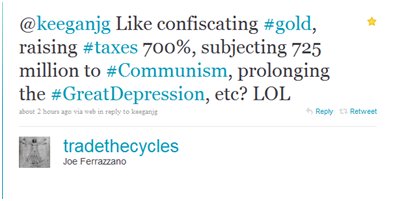I use my twitter account primarily to post links to articles and other things I find interesting and promote my work. The post below is typical:
Usually, all I will get is a retweet, but this post provoked a response.
Mr. Joe Ferrazzano took issue with my comment about Franklin Roosevelt (FDR). Ferrazzano pointed out some things that FDR did wrong, which is difficult to do in 140 characters because FDR was not perfect. Setting aside the confiscation of gold and the raising of taxes and analyzing Ferrazzano’s statements that FDR prolonged the Great Depression and subjected the peoples of Eastern Europe to communism requires more than 140 characters in response.
The argument whether the New Deal prolonged the Great Depression or not is as old as the event itself, and the focusing on it provides an equally distorted view as focusing on the stock market crash of 1929. Barry Karl argued that focusing on the crash provides a distorted view of a crisis that developed slowly. William Leuchtenburg concurrently argued that the market crash played an important but not crucial role in precipitating the Great Depression. Additionally, Leuchtenburg asserted that the stock market crash exposed the underlying weakness of the economic prosperity of the 1920s. Furthermore, no industrialized nation in the world had as unstable or irresponsible a banking system as the United States. Moreover, nothing did more to turn the stock market crash into a prolonged depression than the collapse of the banks, which eroded business and public confidence.
The legislation of the First Hundred Days and the first regular session of the New Deal Congress were efforts to respond to emergency circumstances and were not based on anything that could be construed as a plan. Thus, arguing that FDR’s policies the prolonged the crisis promotes misunderstanding of the New Deal and the circumstances that existed at the time.
Maintaining that FDR’s actions at Yalta subjected the peoples of Eastern Europe of communism suggests that there was something that could have been done to remove Stalin from Eastern Europe or persuade him to keep his word. That is simply not the case. At that time of the Yalta Conference in 1945, the United States, Great Britain, and the other Allied forces were not strong enough to eject Stalin from Eastern Europe. FDR died in April 1945 leaving Truman’s policy of containment the only reasonable option at that time. Suggestions to the contrary are part of the same partisan political argument that suggests China was lost to the communists, and that a victory for communists anywhere was a defeat for democracy everywhere. Such an argument provides an incomplete perspective on the Cold War and its impact on American society.
I appreciate Mr. Ferrazzano response and his point of view. Franklin Roosevelt was imperfect to say the least. Acknowledging those imperfections does not negate those things FDR did right. Two of Mr. Ferrazzano’s examples do not clearly illustrate Roosevelt’s mistakes, which is hard to do in 140 characters.
Further Reading
Books
H. W. Brands, The Devil We Knew: Americans and the Cold War. New York: Oxford University Press, 1993
Barry Karl, The Uneasy State the United States from 1915 to 1945, Chicago: University of Chicago Press, 1983.
William Leuchtenburg, The Perils of Prosperity, 1914-1932 Second Edition, Chicago: University of Chicago Press, 1993.
Papers
Book Review: H. W. Brands,The Devil We Knew: Americans and the Cold War. New York: Oxford University Press, 1993


